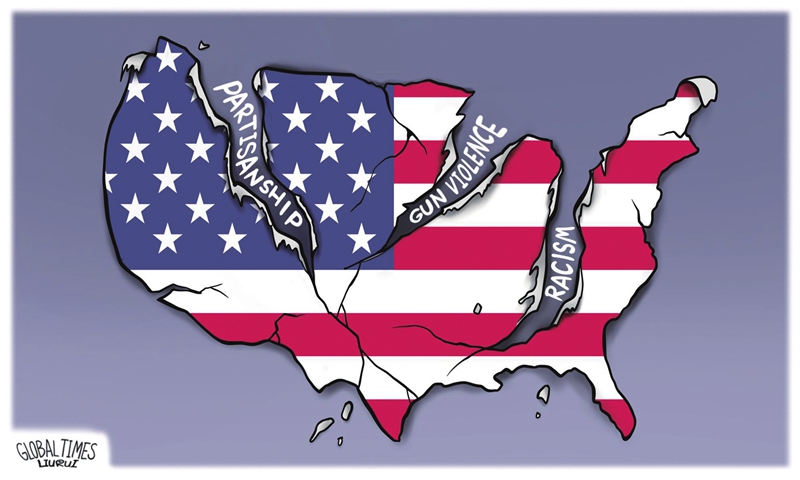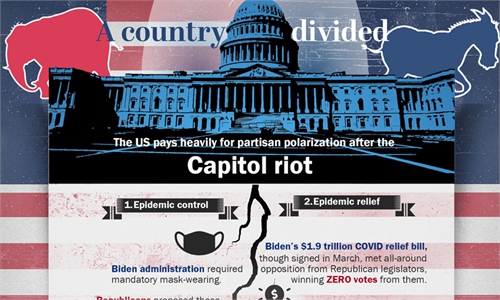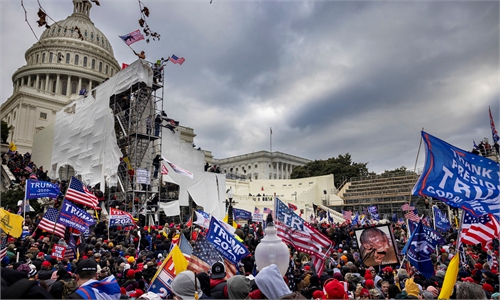
By Liu Rui
It seems that worries are on the rise over the possibility of a new civil war in the US recently. More discussions on this matter occurred in US media especially after the first anniversary of the Capitol riots. For instance, The New York Times carried an opinion piece on January 6, titled "Are We Really Facing a Second Civil War?" A CNN video on Saturday asked a similar question: "Is America heading to civil war or secession?"The US has seen increasing polarization in recent years. Historically, in the US, people with diverse political ideas made compromises. This is demonstrated, for example, in the founding of the US and the drafting of the Constitution. The spirit of compromise, however, has vanished and been replaced with confrontation.
Complex context lies behind the discussions of a potential civil war and divisions in the US. One, globalization has resulted in a growing gap between rich and poor, and the US government fails to narrow the gap. The COVID-19 epidemic has amplified this problem - the rich are getting richer while the poor are getting poorer.
Against such a backdrop, the sense of political identity in the US has increased. As complaints from all classes are filling up society, people get emotional more easily. And they are using more and more intense ways to present their political demands, be they liberal or conservative, white or non-white.
Moreover, former US president Donald Trump intentionally created divisions during his tenure, leading to the inability of the current administration to recover from Trump's presidency.
In short, Trump's push for division, as well as the constant impact of factors like the imbalance of social development and the epidemic, has made confrontation a common phenomenon in US society.
US politics is so overwhelmingly dominated by the two major parties that the rise of a third party as an emerging force seems almost impossible. Those who belong to neither the Democratic Party nor the Republican Party have no chance but to attach themselves to one of the duo, or simply escape from the US political arena.
Meanwhile, amid constant conflicts, neither party is able or willing to cooperate for the sake of the people. Political stalemate emerges. The political struggle in the US goes on and on in the form of extreme confrontation, which will lead to internal conflicts.
This will have an impact on the US' sustainable development. For now, it can be seen mainly politically and socially. But if it continues to worsen, it may also affect the US economy, its science and technology innovation, education, and thus its international status.
Midterm elections will be held in the US this year. The confrontation between the two parties is expected to become fiercer. The US may slide into a quasi state of civil war. What makes an election year a little bit different though is that the individuality of each politician from both sides starts to become increasingly apparent. Take Senator Joe Manchin of West Virginia, a centrist Democrat who has been a loyal supporter of US President Joe Biden in the Senate. Manchin recently turned his back on Biden over many issues, from the Build Back Better package to the president's call for eliminating a longstanding supermajority rule in the Senate known as the "filibuster."
According to US media, Manchin is a "coal magnate who represents one of America's reddest states." He has close ties to the coal industry and has made millions of dollars from US coal companies. Many suggest this is the real reason for his opposition of Biden's Build Back Better plan.
For individual politicians, they have to weigh which is more important to them, the interest of their party or the interest of their own. In this sense, the confrontation in the US is becoming not only intensified, but also complicated.
The article was compiled by Global Times reporter based on an interview with Liu Weidong, a research fellow at the Institute of American Studies at the Chinese Academy of Social Sciences. opinion@globaltimes.com.cn



